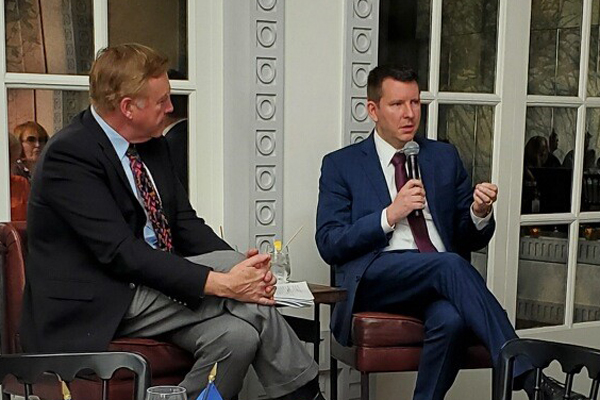
Estonian Ambassador to the U.S. Jonatan Vseviov in conversation with Justin Hughes
On February 24th, 2020 Estonia celebrated 102 years of independence. The following day, the Los Angeles World Affairs Council & Town Hall welcomed Estonian Ambassador to the US, Jonatan Vseviov, for a roundtable lunch discussion moderated by Professor of Law at Loyola Marymount University Justin Hughes.
To begin, Ambassador Vseviov challenged two major assumptions about the country. First, because Estonia is a country of only 1.3 million -- making it one of the least populous members of the EU and NATO -- many assume it’s a young country. But Estonia’s history goes back thousands of years before official independence in 1918. Secondly, Ambassador Vseviov argued that Estonia is not a ‘pro-Western country’:
“We’re not pro-western —we are the west, we’ve been in the West for longer than most other nations in the West have existed. If you read the Declaration of Independence of the US you will see it is based in a lot of the same principles and ideology and philosophy that our declaration is based on— notions of democracy, human rights, freedom and so on.”
From here, the conversation transitioned to Estonia's dark history after losing its independence in 1940 to the Soviet Union. Piecing together decades of history, Ambassador Vseviov pointed to the significance of Iceland being the first nation to recognize Estonia back on the map:
“Tiny Iceland. Talk about bravery and power. You don’t have to be big to be powerful. It took the US longer and the reason for that is the US never recognized the Estonian occupation.”
At this time in 1991, Estonia had no economy or infrastructure -- most people did not even have phone lines. However, over the last thirty years, Estonia has become one of the most innovative countries in Europe.
“You name an organization and we’re a part of it. European Union, NATO, the Euro Zone. Why? Because lesson number 1 from 1939-40 is don’t be alone again. You can't be alone. You need to make sure you are in Western institutions and that once you are in, you make sure those organizations are as strong as possible.”
Today, Estonia is the first state in Europe where 98% of bank transactions take place online. Almost all government services are offered online. Because of this technological innovation, Estonia is one of the fast growing regions within the European Union.
But Ambassador Vseviov concluded on a cautionary note. War is back in Europe and Western countries are no longer strongly unified as they once were. While Estonia’s economy is innovative and future-facing, the country as a whole still relies on the strength of its Western allies.
In our globalized world, even brilliant technology cannot save countries from depending upon the human-driven relationships that sustain diplomacy, allyship, and in turn, national security.
By Claire Krelitz
